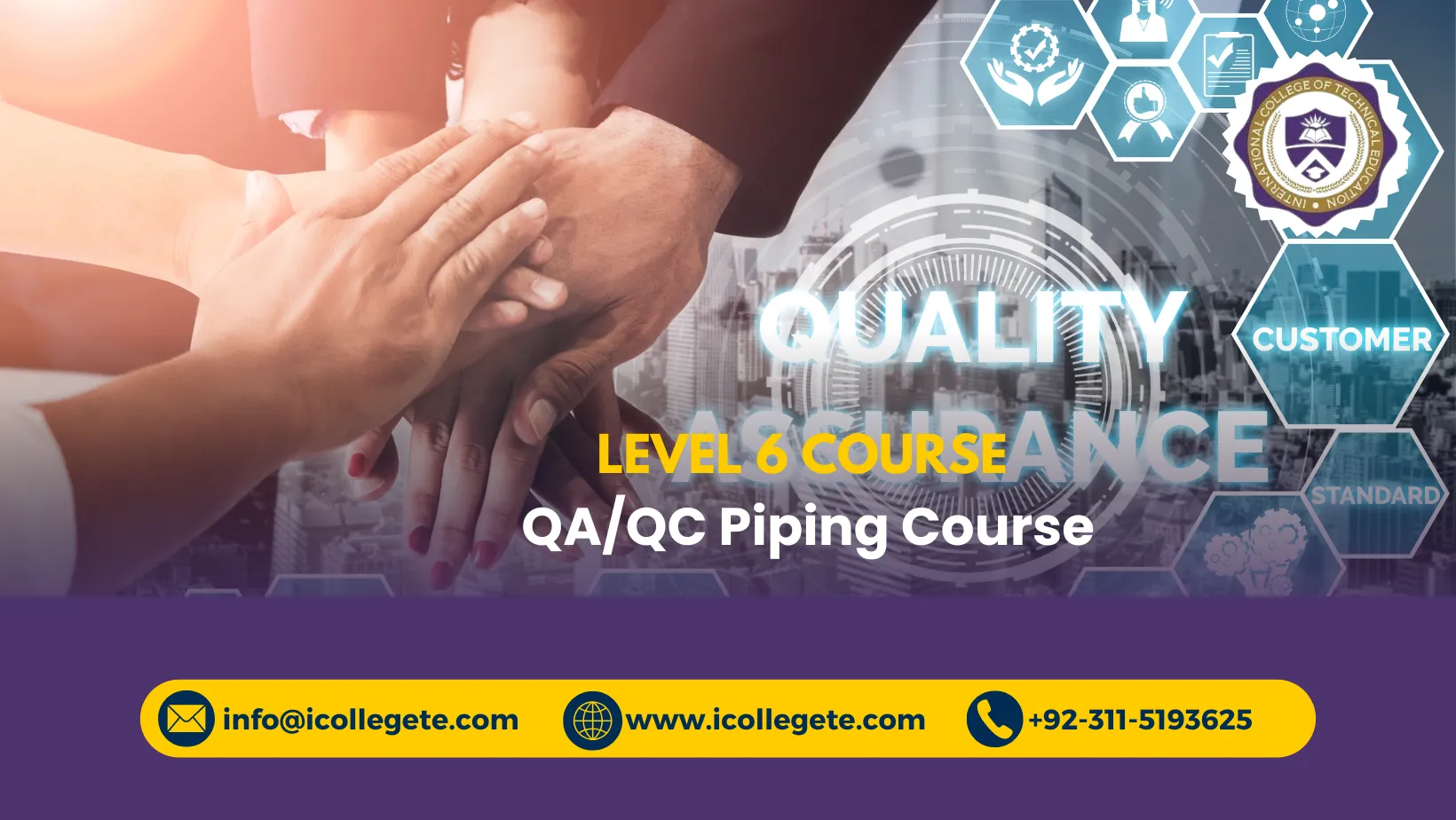Step into the world of industrial quality assurance with the QA/QC Piping Level 6 Course in Rawalpindi, a specialized training program designed to prepare learners for inspection, testing, and compliance roles in piping systems across oil & gas, power plants, and manufacturing sectors. QA/QC Piping Level 6 Course in Rawalpindi delivers the technical knowledge and practical skills required to ensure piping installations meet international standards and project specifications.
Through a structured curriculum and hands-on instruction, participants will learn how to interpret engineering drawings, apply inspection techniques, and conduct non-destructive testing (NDT) procedures. The QA/QC Piping Level 6 Course in Rawalpindi emphasizes real-world applications, including welding inspection, pressure testing, and documentation protocols essential for quality control in high-risk environments.
Ideal for technicians, engineers, and career changers, the QA/QC Piping Level 6 Course is tailored to meet industry demands. Learners will gain proficiency in codes such as ASME, API, and ASTM, and understand how to implement quality plans, inspection checklists, and safety procedures. The QA/QC Piping Level 6 Course in Rawalpindi also covers communication and reporting skills necessary for coordination with project teams and regulatory bodies.
By the end of the QA/QC Piping Level 6 Course in Rawalpindi, participants will be equipped to work confidently in QA/QC departments, contribute to project integrity, and support compliance with global standards. QA/QC Piping Level 6 Course in Rawalpindi offers a direct pathway to employment in Pakistan’s growing industrial and infrastructure sectors.
Course Overview
The QA/QC Piping Level 6 Course in Rawalpindi is a professional-level training program designed to build core competencies in piping inspection and quality control. Structured into six focused study units, the QA/QC Piping Level 6 Course in Rawalpindi provides learners with the technical foundation and field-ready skills required to work in industrial environments where safety, precision, and compliance are critical.
Learners begin by understanding the fundamentals of piping systems, including materials, fabrication methods, and engineering drawings. As the QA/QC Piping Level 6 Course in Rawalpindi progresses, participants are introduced to inspection techniques, welding standards, and non-destructive testing procedures. Each unit is designed to simulate real-world scenarios, enabling learners to apply quality assurance protocols and documentation practices used in oil & gas, power generation, and manufacturing projects.
QA/QC Piping Level 6 Course in Rawalpindi is ideal for individuals seeking to enter or advance in QA/QC roles within Pakistan’s industrial sector. QA/QC Piping Level 6 Course in Rawalpindi suits technicians, diploma holders, and engineering graduates who want to specialize in piping inspection and contribute to project reliability and safety. With increasing demand for certified QA/QC professionals in both domestic and international markets, this Level 6 qualification offers a competitive edge and practical career progression. By completing all six study units, learners gain the confidence and technical fluency to perform inspections, interpret standards, and support quality assurance teams across complex industrial projects.
Course Study Units
- Fundamentals of Piping Systems and Materials
- Engineering Drawings and Piping Isometrics
- Welding Inspection and Quality Standards
- Non-Destructive Testing (NDT) Techniques
- Quality Documentation and Compliance Procedures
- Safety Protocols and Project Coordination in QA/QC
Learning Outcomes for this course
Understanding Piping Systems and Materials
- Identify different types of piping materials used in industrial projects
- Understand the properties and applications of carbon steel, stainless steel, and alloy pipes
- Interpret piping specifications and material standards
- Recognize common fabrication methods and their quality implications
- Analyze material selection based on pressure, temperature, and fluid type
- Understand corrosion mechanisms and prevention techniques
- Apply material traceability procedures in QA/QC documentation
Reading and Interpreting Engineering Drawings
- Understand piping isometrics, general arrangement (GA) drawings, and P&IDs
- Identify symbols, dimensions, and annotations used in piping layouts
- Trace flow paths and system connections from drawings
- Cross-reference drawings with site installations for inspection
- Detect inconsistencies between design and execution
- Support documentation of field changes and redline drawings
- Communicate drawing interpretations with project teams
Conducting Welding Inspection and Quality Checks
- Understand welding processes and joint configurations
- Inspect welds for defects using visual and dimensional checks
- Verify welding procedures and welder qualifications
- Monitor pre-weld, in-process, and post-weld activities
- Apply acceptance criteria from ASME and API standards
- Document welding inspections and maintain traceability
- Coordinate with welding teams for corrective actions
Applying Non-Destructive Testing (NDT) Techniques
- Understand principles of NDT methods: VT, PT, MT, UT, and RT
- Select appropriate NDT techniques based on material and defect type
- Interpret NDT results and identify reportable indications
- Coordinate with certified NDT technicians during inspections
- Ensure compliance with inspection schedules and standards
- Maintain NDT records and integrate findings into QA reports
- Support decision-making for repair or acceptance
Managing Quality Documentation and Compliance
- Prepare inspection test plans (ITPs) and quality checklists
- Maintain records of material certificates and welding logs
- Document inspection results and non-conformance reports (NCRs)
- Ensure compliance with client specifications and regulatory codes
- Organize QA/QC files for audits and project handover
- Communicate findings through structured reporting formats
- Support continuous improvement through documentation review
Implementing Safety and Coordination Protocols
- Understand safety requirements in QA/QC inspection environments
- Coordinate with safety officers during site inspections
- Follow permit-to-work and lockout/tagout procedures
- Identify hazards related to piping systems and inspection tools
- Promote safe practices during welding and testing activities
- Communicate safety concerns to relevant departments
- Support integration of QA/QC with project safety plans
Entry Requirements for this course
Age Applicants must be at least 18 years old. This ensures they are legally eligible for industrial training and capable of handling technical responsibilities in field environments.
• Education Minimum education requirement is matriculation (Grade 10). Preference is given to candidates with intermediate or diploma-level qualifications in mechanical, civil, or technical trades.
• Experience No prior QA/QC experience is required. However, individuals with basic knowledge of piping, welding, or construction practices will benefit from faster comprehension and practical application.
• Language Proficiency Basic understanding of English or Urdu is essential. Learners must be able to read technical documents, interpret standards, and communicate inspection findings clearly.
• Physical Fitness Applicants should be physically fit to perform site inspections, climb scaffolding, and handle tools safely. Fieldwork may involve exposure to industrial environments and elevated areas.
• Technical Aptitude Interest in engineering, fabrication, or inspection processes is recommended. Learners should be comfortable with measurements, diagrams, and structured procedures.
• Safety Awareness Candidates must be willing to follow safety protocols and wear protective gear during practical sessions. Awareness of industrial safety practices is an asset.
• Commitment to Learning Regular attendance, active participation, and completion of assignments are required. Learners must be motivated to engage with both theoretical and hands-on training.
Course Benefits of this course
Industry-Relevant Technical Skills
- Learn to inspect piping systems using international standards
- Understand welding procedures and quality benchmarks
- Apply non-destructive testing techniques in real-world scenarios
- Interpret engineering drawings and piping isometrics accurately
- Monitor fabrication and installation processes for compliance
- Document inspection results with precision and clarity
- Identify material defects and recommend corrective actions
- Support quality assurance teams in industrial projects
- Build confidence in executing field inspections independently
Career Advancement Opportunities
- Qualify for QA/QC roles in oil & gas, power, and manufacturing sectors
- Enhance your resume with a Level 6 certification
- Increase employability in domestic and international markets
- Prepare for supervisory roles in inspection and quality control
- Gain recognition as a certified piping inspector
- Access job opportunities in EPC and infrastructure firms
- Build a foundation for future specialization in NDT or welding inspection
- Position yourself for long-term career growth in technical fields
- Transition from general technician roles to quality-focused positions
Practical Knowledge of Inspection Tools
- Use measuring instruments for dimensional verification
- Operate NDT equipment for surface and volumetric testing
- Apply visual inspection techniques for welds and joints
- Understand calibration and equipment maintenance procedures
- Record inspection data using standard formats
- Support tool selection based on inspection requirements
- Troubleshoot equipment issues during fieldwork
- Ensure accuracy and reliability of inspection results
- Gain hands-on experience with industry-grade tools
Compliance with International Standards
- Learn ASME, API, ASTM, and ISO codes relevant to piping QA/QC
- Apply acceptance criteria for welds, materials, and installations
- Ensure documentation aligns with client and regulatory expectations
- Support audits and third-party inspections confidently
- Maintain traceability of materials and procedures
- Understand legal and contractual obligations in quality control
- Promote ethical practices in inspection and reporting
- Align work with global quality benchmarks
- Build credibility in international project environments
Enhanced Safety Awareness
- Identify hazards associated with piping systems and inspection activities
- Follow permit-to-work and lockout/tagout procedures
- Use personal protective equipment (PPE) correctly
- Coordinate with safety teams during inspections
- Promote safe practices in welding and testing zones
- Understand emergency protocols and site safety plans
- Document safety observations and incidents accurately
- Support integration of QA/QC with safety management systems
- Reduce risks through proactive inspection planning
Strong Documentation and Reporting Skills
- Prepare inspection test plans and quality checklists
- Maintain detailed records of inspection activities
- Document non-conformance reports and corrective actions
- Organize QA/QC files for audits and project handover
- Communicate findings through structured reports
- Support digital documentation systems and formats
- Ensure consistency in recordkeeping across teams
- Build habits of accuracy and completeness in reporting
- Contribute to transparent and traceable project documentation
Real-World Project Readiness
- Simulate field conditions during practical sessions
- Learn to coordinate with engineers, welders, and supervisors
- Understand project timelines and inspection schedules
- Apply QA/QC procedures in live project environments
- Manage inspection tasks under pressure and deadlines
- Support quality control during fabrication and erection stages
- Build adaptability across different project types
- Gain exposure to industrial workflows and team dynamics
- Prepare for immediate deployment in field roles
Communication and Coordination Skills
- Communicate inspection results to project stakeholders
- Collaborate with multidisciplinary teams on quality issues
- Schedule inspections and follow-up actions effectively
- Handle client queries and documentation requests professionally
- Support coordination between site and office teams
- Build trust through clear and timely communication
- Present findings in meetings and review sessions
- Maintain professionalism in written and verbal exchanges
- Strengthen interpersonal skills for team-based environments
Business and Freelance Potential
- Offer QA/QC services to contractors and small firms
- Build a portfolio of inspection projects and reports
- Market your skills to industrial clients and consultancies
- Support documentation and compliance for subcontractors
- Deliver training to junior technicians or site staff
- Develop pricing models for freelance inspection services
- Create templates and tools for quality documentation
- Expand into niche markets like welding audits or NDT coordination
- Position yourself as an independent QA/QC consultant
Local and Global Relevance
- Apply skills in Pakistan’s growing industrial and infrastructure sectors
- Align training with international job requirements and standards
- Support migration goals with recognized certification
- Work with multinational companies and joint ventures
- Understand global QA/QC practices and expectations
- Build adaptability across diverse work environments
- Enhance employability in overseas inspection roles
- Contribute to quality assurance in global supply chains
Who Should Enroll in this course
- Diploma Holders in Mechanical or Civil Technology Individuals with DAE qualifications seeking to specialize in piping inspection and quality control for industrial projects.
- Fresh Engineering Graduates Mechanical, petroleum, or industrial engineering graduates aiming to enter the QA/QC field with practical, job-ready skills.
- Experienced Welders and Fabricators Skilled tradespeople who want to transition into inspection roles and understand the quality standards behind their work.
- Site Supervisors and Foremen On-site personnel responsible for overseeing piping installations who need formal training in inspection and compliance.
- Technicians Working in Oil & Gas or Power Plants Field technicians looking to upgrade their skills and qualify for QA/QC roles in high-pressure environments.
- Construction Quality Inspectors Professionals already involved in quality assurance who want to specialize in piping systems and related documentation.
- Project Coordinators and Engineers Individuals managing construction or industrial projects who need to understand QA/QC protocols for better coordination.
- NDT Assistants and Trainees Entry-level NDT personnel seeking to expand their knowledge into piping inspection and quality documentation.
- Safety Officers Seeking Cross-Training HSE professionals who want to understand inspection procedures to better align safety and quality standards on site.
- Unemployed Technical Workers Job seekers with a technical background looking for a high-demand skill set that leads to stable employment.
- Individuals Preparing for Gulf or Overseas Jobs Candidates targeting QA/QC roles abroad where certified piping inspectors are in high demand across industries.
- Contractors and Subcontractors in Industrial Projects Business owners or team leads who want to ensure their work meets client and regulatory quality expectations.
- Maintenance Technicians in Industrial Plants Workers involved in plant maintenance who need to understand inspection criteria for piping systems and repairs.
- Welding Inspectors Seeking Piping Specialization Certified welding inspectors who want to expand their expertise into piping QA/QC for broader career opportunities.
- Technical Trainers and Vocational Instructors Educators in technical institutes who want to update their knowledge and deliver industry-relevant training.
- Quality Control Assistants in Fabrication Yards Entry-level QA/QC staff looking to formalize their skills and advance into senior inspection roles.
- Civil Engineers Working on Infrastructure Projects Engineers involved in utility and piping works who need to understand inspection protocols and documentation.
- Individuals Interested in Industrial Compliance Learners who want to contribute to quality assurance, documentation, and regulatory compliance in technical environments.
- Freelancers Offering QA/QC Services Independent professionals who want to build credibility and expand their service offerings in piping inspection.
- Anyone Seeking a Technical Career with Global Demand Motivated individuals looking for a future-proof career path in industrial quality control with local and international relevance.
Future Progression of this course
Advanced Welding Inspection and Certification
- Qualify for advanced welding inspection roles in industrial projects
- Learn to verify welding procedure specifications (WPS) and welder qualifications
- Conduct in-depth inspections of complex weld joints and pipe fittings
- Apply international welding codes such as ASME Section IX and AWS D1.1
- Document welding activities and maintain traceability records
- Coordinate with welding teams for quality assurance and compliance
- Support third-party inspections and client audits
- Prepare for certification as a welding inspector through recognized bodies
- Build expertise in welding defect identification and resolution
Non-Destructive Testing (NDT) Specialization
- Advance into specialized NDT roles across multiple industries
- Learn to interpret results from UT, RT, MT, PT, and VT techniques
- Support NDT teams with inspection planning and documentation
- Apply NDT methods to piping systems, pressure vessels, and structural components
- Maintain calibration records and equipment logs
- Ensure compliance with NDT standards and reporting formats
- Assist in defect analysis and repair recommendations
- Prepare for Level I and II NDT certifications
- Build a career in inspection services and testing labs
QA/QC Coordination and Supervision
- Take on supervisory roles in QA/QC departments
- Manage inspection teams and allocate tasks across project phases
- Review inspection reports and ensure documentation accuracy
- Coordinate with project managers and site engineers
- Monitor compliance with quality plans and ITPs
- Resolve non-conformance issues and implement corrective actions
- Conduct internal audits and quality reviews
- Train junior inspectors and technicians
- Build leadership skills in quality management
Quality Documentation and Audit Preparation
- Develop structured documentation systems for QA/QC records
- Prepare inspection logs, NCRs, and material traceability reports
- Organize files for client handover and regulatory audits
- Support digital documentation platforms and cloud-based systems
- Maintain version control and document integrity
- Align documentation with ISO and project-specific standards
- Assist in audit readiness and compliance reviews
- Build expertise in document formatting and reporting
- Contribute to transparent and traceable project workflows
Piping QA/QC in Oil & Gas Projects
- Work on high-pressure piping systems in oil refineries and gas plants
- Inspect pipelines, valves, and pressure vessels for compliance
- Monitor welding and fabrication activities in hazardous environments
- Apply API and ASME standards for oil & gas installations
- Document inspection results for regulatory and client review
- Coordinate with safety teams during inspection procedures
- Support shutdown and turnaround QA/QC operations
- Build specialization in upstream and downstream piping systems
- Prepare for long-term roles in energy sector quality control
QA/QC Roles in Power Generation and Utilities
- Inspect piping systems in thermal, hydro, and nuclear power plants
- Monitor installation of steam lines, condensate systems, and cooling networks
- Apply quality standards for high-temperature and high-pressure systems
- Support commissioning and operational readiness inspections
- Document quality checks for utility infrastructure projects
- Coordinate with electrical and mechanical teams on integrated systems
- Ensure compliance with national and international power sector codes
- Build expertise in utility-grade piping QA/QC
- Contribute to safe and efficient power generation operations
Freelance and Consultancy Opportunities
- Offer independent QA/QC inspection services to contractors and firms
- Build a portfolio of completed inspections and quality reports
- Market services to fabrication yards, construction sites, and industrial clients
- Provide documentation support for audits and certifications
- Deliver training workshops for technicians and junior inspectors
- Develop templates and tools for quality documentation
- Expand into niche areas like welding audits or NDT coordination
- Establish a consultancy brand in industrial quality assurance
- Scale operations with remote and on-site service models
Technical Sales and Client Support Roles
- Transition into technical sales for QA/QC equipment and services
- Demonstrate inspection tools and software to potential clients
- Prepare proposals and documentation for quality solutions
- Support client onboarding and training in QA/QC systems
- Collaborate with engineering and procurement teams
- Build relationships with industrial buyers and project managers
- Provide after-sales support and troubleshooting
- Align product offerings with client quality requirements
- Grow into business development roles in inspection technology
Quality Control in Fabrication and Manufacturing
- Inspect piping components during fabrication stages
- Monitor quality of flanges, elbows, tees, and fittings
- Apply dimensional checks and surface inspections
- Document production quality and material verification
- Coordinate with production teams for defect resolution
- Support continuous improvement in manufacturing processes
- Align fabrication QA/QC with client specifications
- Prepare reports for batch approval and delivery
- Build expertise in shop-floor quality control
International Employment and Certification Pathways
- Align skills with global QA/QC standards and job requirements
- Prepare for certifications like CSWIP, BGAS, or API 570
- Build documentation portfolios for overseas job applications
- Connect with recruiters and inspection firms abroad
- Gain language and cultural readiness for international roles
- Serve diverse environments across regions and industries
- Increase earning potential through global mobility
- Contribute to international infrastructure and energy projects
- Position yourself for long-term success in global QA/QC careers
Conclusion
The QA/QC Piping Level 6 Course in Rawalpindi is more than a technical qualification—it’s a strategic investment in your professional future. As industries evolve and infrastructure projects grow in complexity, the demand for individuals who can uphold quality, ensure safety, and maintain compliance is rising steadily. QA/QC Piping Level 6 Course in Rawalpindi positions you to meet that demand with confidence and clarity.
What makes QA/QC Piping Level 6 Course in Rawalpindi distinct is its ability to sharpen your judgment, not just your technical skills. It trains you to think critically about quality risks, anticipate inspection challenges, and contribute meaningfully to project outcomes. You’ll develop a mindset that values precision, accountability, and continuous improvement—traits that are essential in high-stakes environments.
Whether you’re entering the workforce or transitioning from another role, QA/QC Piping Level 6 Course in Rawalpindi helps you build a professional identity rooted in reliability and technical integrity. QA/QC Piping Level 6 Course in Rawalpindi not just about learning standards—it’s about becoming someone others trust to uphold them.
In a world where quality assurance is no longer optional but essential, QA/QC Piping Level 6 Course in Rawalpindi gives you the tools to lead with purpose. You’ll walk away not only with a certificate but with the confidence to step into roles that demand both skill and responsibility. It’s a step forward for your career—and a leap toward professional excellence.






